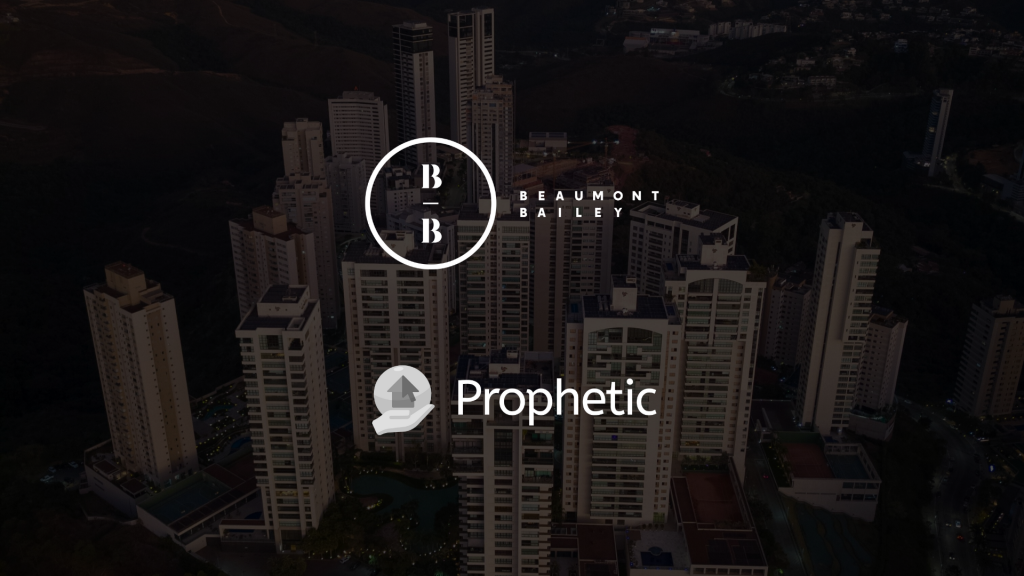Technology Spotlight: A Conversation with Prophetic
By Emma Callahan

 When Oliver Alexander, Founder and CEO of Prophetic, speaks about his company, he doesn’t start with real estate, he starts with healthcare. His career started in rural Oregon, where he co-founded Orchid Health, a network of primary care clinics aimed at expanding access to underserved communities. However, while searching for land to build new clinics, he encountered a problem that would alter his career.
When Oliver Alexander, Founder and CEO of Prophetic, speaks about his company, he doesn’t start with real estate, he starts with healthcare. His career started in rural Oregon, where he co-founded Orchid Health, a network of primary care clinics aimed at expanding access to underserved communities. However, while searching for land to build new clinics, he encountered a problem that would alter his career.
“I couldn’t believe it was this difficult to assess off-market land for development,” he recalls. “The process was slow, opaque, and incredibly frustrating. It didn’t make sense that in 21st-century America, something as basic as finding land to build on was still so inefficient.”
That frustration became the seed which grew to the idea of Prophetic, a platform that uses AI to transform how developers source and evaluate land. Today, Prophetic is scaling across the United States, helping residential builders, multifamily developers, and industrial operators move at speeds the industry has never seen before.
Reinventing Land Acquisition
At its core, Prophetic helps developers do three things: Find parcels of land, analyse them quickly, and organise their acquisition pipeline at scale. What used to take weeks of manual research and guesswork can now be achieved in minutes.
According to Oliver, the difference is dramatic.
“Our customers are moving forty-two times faster than before,” he says. “Within a month of deployment, they’ve expanded their pipeline by 5-10x. Instead of a reactive approach and waiting for the phone to ring, they’re finally able to be ultra proactive and go hunt for dirt.”
This shift is proving transformative. Enterprise clients have maintained a 95.3% daily usage rate over the past twelve months, an extraordinary level of engagement that underscores how indispensable Prophetic has become to their day-to-day operations.
Who’s Using Prophetic?
Prophetic’s strongest foothold is in residential real estate. National homebuilders rely on the technology to secure subdivision land, while custom home and multifamily developers use it to identify opportunities that would otherwise remain hidden & shorten their speed to decision process. The platform is also gaining traction in the industrial sector, particularly in areas like self-storage, and even brokers are adopting it to accelerate their deal flow.
“What we’re seeing is that once a developer or broker starts using Prophetic, they don’t go back,” Oliver explains. “It becomes part of how they operate. They can’t imagine competing without it.”
The Technology
Behind Prophetic are AI-driven tools designed to streamline one of the most complex aspects of the real estate development cycle.
SiteAI, for example, can generate a subdivision site plan in just 30 seconds, a process that usually requires weeks of engineering work. Its upcoming second version will incorporate stormwater retention, open space, separate home models & setback analysis, and topographical awareness, producing plans that are not just fast but genuinely buildable.
DevMap pushes further, moving beyond permits to predict where subdivisions are likely to emerge. By combining advanced logic with a range of hidden signals, it can even identify parcels linked to anonymous LLCs, a layer of insight that would otherwise take months of detective work.
SearchAI takes the complexity out of zoning. Instead of wading through dense code and legal terminology, developers can query custom map polygons, cities, and counties in plain language, focusing on their actual intentions rather than trying to filter based on a specific zone code name.
And then there is ZoneAI, Prophetic’s flagship product. It is, in Oliver’s words, “a zoning architecture tool that actually understands nuance.” By parsing zoning manuals, nesting exceptions, and citing sources, ZoneAI enables developers not only to trust the output but also to verify it themselves.
“Accuracy and transparency are everything,” he emphasised. “It’s not enough for us to say the data is right. Users have to be able to fact-check us.”
What Makes Prophetic Different?
While Prophetic operates in a competitive market, Oliver believes three factors set the company apart. Firstly, their edge stems from the team’s deep AI expertise, with PhDs building cutting edge solutions that are only recently possible given rapid advances in AI technology. Second, the company has made a seven-figure annual investment in data, ensuring that its property information is both comprehensive and up-to-date. And third, Prophetic offers functionality no one else does, from instant subdivision plans to predictive development mapping.
“Price-wise we tend to sit at the mid to high end of the market, but while we’re not the cheapest, we have proven that Prophetic is hands down the most valuable if growth is your goal” he stated.
Scaling Up
Prophetic is currently active in twenty U.S. states, with plans to expand nationwide within the following year. This rapid growth is being driven by demand from some of the country’s largest homebuilders, who are licensing the platform across their entire organisation.
Building the Right Team
As Prophetic grows, so too does its need for talent. The team has doubled in size over the past year and is expected to double again by January, with a focus on engineering and sales. Yet Oliver is honest about the challenges of hiring at speed.
“What we’ve learned is that startup DNA is non-negotiable,” he explains. “People who know how to build the plane while flying it thrive here. But those who come from highly structured corporate environments often find the pace a bit challenging.”
To-date, many of the company’s best hires have come through referrals, supported by strong venture funding that allows Prophetic to compete for top candidates. Sales leadership remains the most challenging role to fill. “It’s not easy to find someone who can both close deals and build a team,” Oliver admits. “But that’s the kind of talent we need if we’re going to scale effectively.”
Into the Future
From its beginnings in healthcare to its current role at the cutting edge of proptech, Prophetic has already come a long way, but Oliver insists this is just the beginning.
“What excites me is that we’re not just making land acquisition easier,” he says. “We’re redefining what’s possible in development. Prophetic isn’t just a tool, it’s a new way to scale.”
I believe all of us, including myself, look forward to Prophetic’s continued journey.
 If you would like to discuss any of the topics raised in this piece, or if you need support with your leadership resourcing strategy, please get in touch with Emma Callahan on: emma.callahan@beaumontbailey.com.
If you would like to discuss any of the topics raised in this piece, or if you need support with your leadership resourcing strategy, please get in touch with Emma Callahan on: emma.callahan@beaumontbailey.com.




